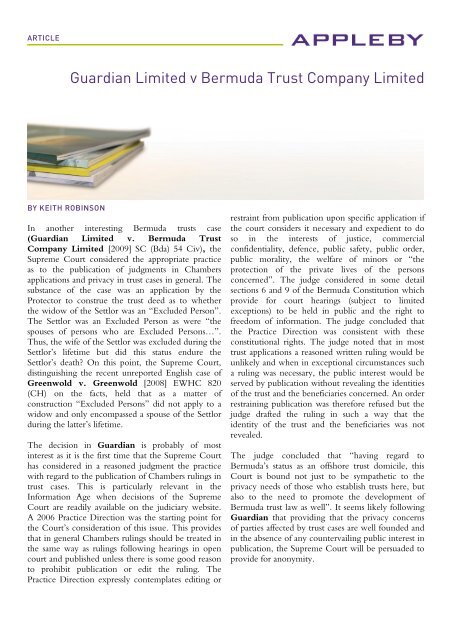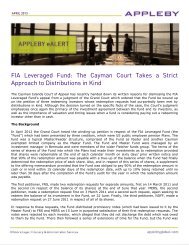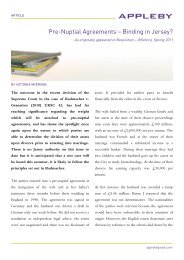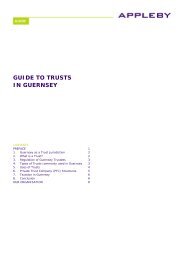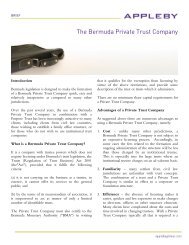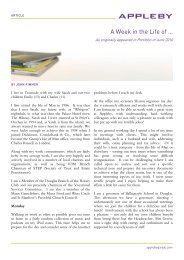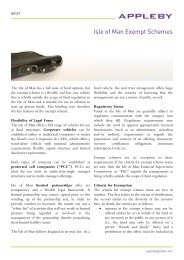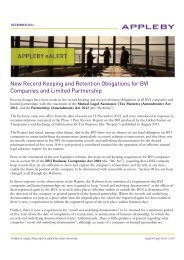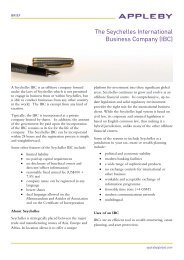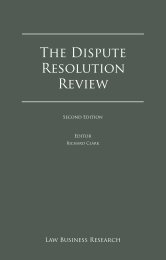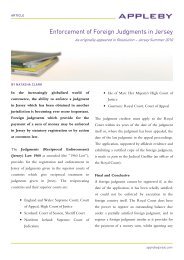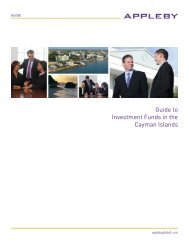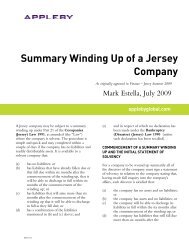Guardian Limited v Bermuda Trust Company Limited - Appleby
Guardian Limited v Bermuda Trust Company Limited - Appleby
Guardian Limited v Bermuda Trust Company Limited - Appleby
You also want an ePaper? Increase the reach of your titles
YUMPU automatically turns print PDFs into web optimized ePapers that Google loves.
ARTICLE<strong>Guardian</strong> <strong>Limited</strong> v <strong>Bermuda</strong> <strong>Trust</strong> <strong>Company</strong> <strong>Limited</strong>BY KEITH ROBINSONIn another interesting <strong>Bermuda</strong> trusts case(<strong>Guardian</strong> <strong>Limited</strong> v. <strong>Bermuda</strong> <strong>Trust</strong><strong>Company</strong> <strong>Limited</strong> [2009] SC (Bda) 54 Civ), theSupreme Court considered the appropriate practiceas to the publication of judgments in Chambersapplications and privacy in trust cases in general. Thesubstance of the case was an application by theProtector to construe the trust deed as to whetherthe widow of the Settlor was an “Excluded Person”.The Settlor was an Excluded Person as were “thespouses of persons who are Excluded Persons…”.Thus, the wife of the Settlor was excluded during theSettlor’s lifetime but did this status endure theSettlor’s death? On this point, the Supreme Court,distinguishing the recent unreported English case ofGreenwold v. Greenwold [2008] EWHC 820(CH) on the facts, held that as a matter ofconstruction “Excluded Persons” did not apply to awidow and only encompassed a spouse of the Settlorduring the latter’s lifetime.The decision in <strong>Guardian</strong> is probably of mostinterest as it is the first time that the Supreme Courthas considered in a reasoned judgment the practicewith regard to the publication of Chambers rulings intrust cases. This is particularly relevant in theInformation Age when decisions of the SupremeCourt are readily available on the judiciary website.A 2006 Practice Direction was the starting point forthe Court’s consideration of this issue. This providesthat in general Chambers rulings should be treated inthe same way as rulings following hearings in opencourt and published unless there is some good reasonto prohibit publication or edit the ruling. ThePractice Direction expressly contemplates editing orrestraint from publication upon specific application ifthe court considers it necessary and expedient to doso in the interests of justice, commercialconfidentiality, defence, public safety, public order,public morality, the welfare of minors or “theprotection of the private lives of the personsconcerned”. The judge considered in some detailsections 6 and 9 of the <strong>Bermuda</strong> Constitution whichprovide for court hearings (subject to limitedexceptions) to be held in public and the right tofreedom of information. The judge concluded thatthe Practice Direction was consistent with theseconstitutional rights. The judge noted that in mosttrust applications a reasoned written ruling would beunlikely and when in exceptional circumstances sucha ruling was necessary, the public interest would beserved by publication without revealing the identitiesof the trust and the beneficiaries concerned. An orderrestraining publication was therefore refused but thejudge drafted the ruling in such a way that theidentity of the trust and the beneficiaries was notrevealed.The judge concluded that “having regard to<strong>Bermuda</strong>’s status as an offshore trust domicile, thisCourt is bound not just to be sympathetic to theprivacy needs of those who establish trusts here, butalso to the need to promote the development of<strong>Bermuda</strong> trust law as well”. It seems likely following<strong>Guardian</strong> that providing that the privacy concernsof parties affected by trust cases are well founded andin the absence of any countervailing public interest inpublication, the Supreme Court will be persuaded toprovide for anonymity.
Author: KEITH ROBINSONAssociateklrobinson@applebyglobal.comThis publication is intended only to provide a summary of the subject mattered covered. It does not purport to becomprehensive or to provide legal advice. No person should act in reliance on any statement contained in this publicationwithout first obtaining specific professional advice.February 2010© <strong>Appleby</strong>
BahrainCayman IslandsJerseySeychelles<strong>Bermuda</strong>Hong KongLondonZurichBritish Virgin IslandsIsle of ManMauritius


